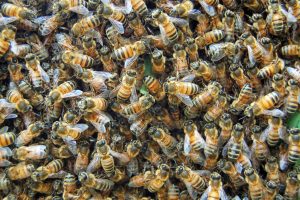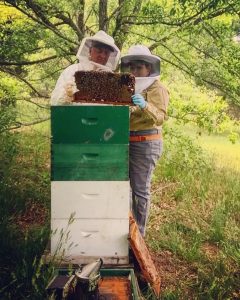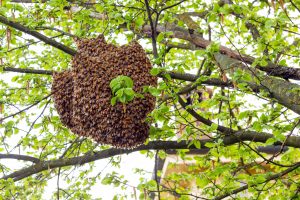Sunday hunting is prohibited on all State Forest property More Info
All beekeepers using Apivar or Amiflex (active ingredient amitraz) miticides should be aware that Varroa mites are developing resistance to amitraz. When using Apivar or Amiflex, the Delaware State Apiarist recommends that beekeepers conduct mite counts by alcohol wash before and after treatment to ensure the mite load has decreased. Keeping long-term records can also help beekeepers to see if a product is losing effectiveness over several years of application.
For more information, read the complete Bee Health Advisory: Delaware Bee Colonies Showing Varying Levels of Resistance to Products Containing Amitraz for Treatment of Varroa.
Scroll down to our Educational Resources to watch a video to learn how to check for Varroa mites, and check out our Varroa Mites Factsheet to find out what treatment options are available in Delaware.
 Successful fruit and vegetable production would be at risk without a healthy honey bee population. Bees are also essential for pollinating wildflowers and native trees and shrubs, which are the backbone of the state’s forests and natural areas, which yield the fruits and seeds that sustain wildlife.
Successful fruit and vegetable production would be at risk without a healthy honey bee population. Bees are also essential for pollinating wildflowers and native trees and shrubs, which are the backbone of the state’s forests and natural areas, which yield the fruits and seeds that sustain wildlife.
Delaware’s 7,200 bee colonies, valued at $350 per colony, represent a $2.5 million honey bee industry for the state and contribute to the successful production of nearly $30 million worth of fruits and vegetables annually. The Delaware Department of Agriculture’s Plant Industries Section protects the pollination needs of the fruit and vegetable industry by ensuring that the honey bee population, both native and migratory, is free of injurious honey bee pests and diseases. When contagious diseases and pests are detected, the section is responsible for enacting control measures.
The Beekeeping Law (Title 3 Chapter 75) includes the appointment of a State Apiarist, who is charged with numerous duties to protect the health of Delaware bees. These duties include the inspection of hives and queen-rearing apiaries, maintaining a list of registered beekeepers, and promoting the science of beekeeping through education and other means. In addition, for registered beekeepers, the State maintains a roster of swarm removal and pollination services and hosts BeeCheck, a pesticide application notification system at no cost to the beekeeper.
 All honeybee colonies must be registered and inspected for diseases, mites, and Africanized bees. Surveys are conducted for Africanized bees along Delaware’s coastal anchorages and in the Ports of Wilmington and Delaware City. By law, the State Apiarist and state bee inspectors may enter any public or private premises and have access to and from all apiaries or places where bees and bee equipment are kept to inspect them for pests and diseases. The State Apiarist may also declare a quarantine and order the destruction or treatment of hives for serious pest or disease situations.
All honeybee colonies must be registered and inspected for diseases, mites, and Africanized bees. Surveys are conducted for Africanized bees along Delaware’s coastal anchorages and in the Ports of Wilmington and Delaware City. By law, the State Apiarist and state bee inspectors may enter any public or private premises and have access to and from all apiaries or places where bees and bee equipment are kept to inspect them for pests and diseases. The State Apiarist may also declare a quarantine and order the destruction or treatment of hives for serious pest or disease situations.
Whether one hive or 100, all persons keeping bees in Delaware must register annually with the State Apiarist. Section 7504 of the law states, “All persons keeping bees in this State shall notify the State Apiarist within 10 days of the time the bees are acquired, of the number and location of colonies they own, or rent, or which they keep for anyone else, whether the bees are located on their own or someone else’s property.” All persons keeping bees, including migratory colonies, in the State must register annually with the Delaware Department of Agriculture on or before January 30 of each year. The Beekeeping law specifies penalties for violations. Anyone who violates the beekeeping law is subject to a civil penalty of no less than $100 and no more than $1000 per count.
NEW! 12.14.22 Complete and submit the Online Apiary Registration. The new registration form can be completed on your cell phone, tablet, or computer.
Video: Registering Your Apiary and Signing Up For Beecheck
 Honey bee swarms may contain several hundred to several thousand worker bees, a few drones, and one queen. Swarming bees fly around briefly and then cluster on a tree limb, shrub, or another object. Clusters usually remain stationary for an hour to a few days, depending on the weather and the time needed to find a new nest site by scouting bees. When a suitable location for the new colony, such as a hollow tree, is found, the swarm breaks up and flies to its new home.
Honey bee swarms may contain several hundred to several thousand worker bees, a few drones, and one queen. Swarming bees fly around briefly and then cluster on a tree limb, shrub, or another object. Clusters usually remain stationary for an hour to a few days, depending on the weather and the time needed to find a new nest site by scouting bees. When a suitable location for the new colony, such as a hollow tree, is found, the swarm breaks up and flies to its new home.
Under most circumstances, honey bee swarms are not dangerous. Swarming honey bees feed before swarming, reducing their ability to sting. Furthermore, bees away from the vicinity of their nest (offspring and food stores) are less defensive and unlikely to sting unless provoked.
In most situations, when a honey bee swarm is found on a tree, shrub, or house, you do not need to do anything. Swarms are temporary; the bees will move on if you patiently ignore them. Stay back and keep others away from the swarm, but feel free to admire and appreciate the bees from a safe distance.
In the case of a swarm and you want to have it removed, a beekeeper can come to gather the swarm and relocate it. You will want to select a beekeeper in the county in which you reside so that they can get the swarm back to their apiary.
2024 Delaware Honey Bee Swarm Removal List Updated: April 5, 2024
If you have a honey bee colony living in your home or other structure, these beekeepers can cut the hive out of the structure and relocate it into a working apiary:
2024 Delaware Honey Bee Cut Out List Updated: April 5, 2024
These beekeepers provide pollination services for farmers or gardeners interested in renting bee colonies to pollinate their crops.
2020 Commercial Pollinator Services List
 One critical aspect of Delaware’s Managed Pollinator Protection Plan is preventing pesticide drift onto bees. Delaware beekeepers can participate in an online tool to help protect them from drift due to weather and wind.
One critical aspect of Delaware’s Managed Pollinator Protection Plan is preventing pesticide drift onto bees. Delaware beekeepers can participate in an online tool to help protect them from drift due to weather and wind.
The BeeCheck program allows beekeepers to add their state-registered beehives to the DriftWatch map, a voluntary program that helps beekeepers and pesticide applicators communicate and share information. The free DriftWatch program provides an online map to alert pesticide applicators to sensitive areas near application sites. Applicators can then take special precautions to avoid drifting onto those areas. Enrolling a location does not guarantee that pesticides are not sprayed near a property but instead aims to improve awareness of pesticide use and reduce instances of drift exposure. This program is not a substitute for any state regulatory requirements.
The BeeCheck mapping tool is meant to help pesticide applicators and beekeepers communicate more effectively to promote awareness and stewardship activities to help prevent and manage drift effects. The site features a powerful map interface that clearly shows applicators the locations of registered sites so they can utilize the information in their ongoing stewardship activities before spraying.
Go to www.driftwatch.org to register for BeeCheck. The DDA Pesticide Section has additional information regarding DriftWatch and how to register. Official BeeCheck field signs and flags are available through the DDA Pesticide Section and can be used for additional communication and awareness.
For questions or assistance with adding your state-registered beehive(s) to the DriftWatch map,
please email Chris Wade, Data Steward, or call (302) 698-4570.
Video 1: How to Check for Varroa Mites
Video 2: Best Practices for Suburban and Urban Beekeeping
Video 3: Best Practices for Preventing and Detecting Robbing
Video 4: Best Practices for Splitting Hives
Video 5: American and European Foulbrood
Fact Sheet: Honey Labeling Guidelines for Delaware Beekeepers
Fact Sheet: How to Submit Bee Samples
Fact Sheet: American Foulbrood
Fact Sheet: European Foulbrood
Delaware Beekeepers Association, founded in 1936, works to educate members on the importance of honeybees, their role in pollinating plant species, and how to keep bees through annual training.
If you have questions regarding honeybees, including registering hives, swarm removal, and pollination services, please contact:
Contact Us
Business Phone: 302-698-4585